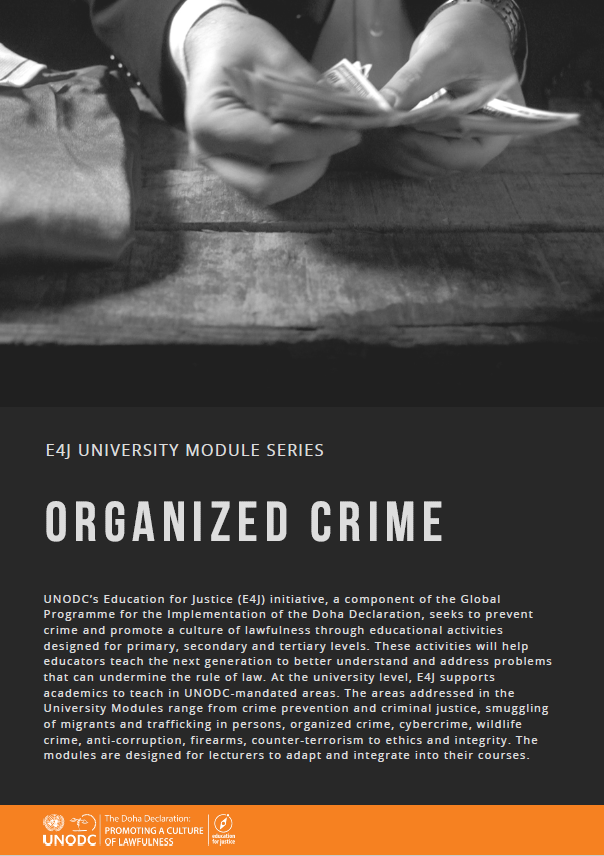
University Module Series
 Organized Crime
Organized Crime
Module Series
Overview
Education should be a fundamental area of work of any effective crime prevention strategy. Organized crime, in particular, is a truly global phenomenon that affects the everyday life of all of us. It is more concealed then other crimes, as organized criminal groups make targeted efforts at keeping their crimes and organization under the radar of law enforcement authorities. It is also harder to eradicate, as it often insinuates the culture and even the way of living of populations around the world. As such, it can be effectively tackled only if people have the necessary knowledge to understand it and are empowered to stand up against it. To this end, the Education for Justice (E4J) initiative developed a series of Modules on Organized Crime, which lecturers can adapt and use as a basis for teaching in universities and academic institutions across the world. The modules seek to enhance students' understanding of organized crime, its implications as well as of the tools at our disposal in the fight against it. They also aim at sharing stories, good practices and lesson learned across national borders. To increase their effectiveness, the modules connect theory to practice, encourage critical thinking, and use innovative interactive teaching approaches such as experiential learning and group-based work. The modules are multi-disciplinary and can be integrated in a series of courses ranging from law to international relations, sociology, anthropology, economics, criminology and many other disciplines. By focusing on the United Nations tools and definitions, the modules leave room for diverse perspectives and lecturers can easily adapt them to different local and cultural contexts. Additional pedagogical guidance for lecturers is provided in the E4J Teaching Guide on Organized Crime (forthcoming).
Terms of Use and Disclaimers
The following modules are available online:
- Module 1: Definitions of Organized Crime
- Module 2: Organizing the Commission of Crimes
- Module 3: Organized Crime Markets
- Module 4: Infiltration of Organized Crime in Business and Government
- Module 5: Conceptualizing and Measuring Organized Crime
- Module 6: Causes and Facilitating Factors of Organized Crime
- Module 7: Models of Organized Criminal Groups
- Module 8: Law Enforcement Tools and Cooperation
- Module 9: Prosecution Strategies
- Module 10: Sentencing and Confiscation in Organized Crime
- Module 11: International Cooperation to Combat Transnational Organized Crime
- Module 12: Prevention of Organized Crime
- Module 13: Cyber Organized Crime
- Module 14: United Nations Convention against Transnational Organized Crime and Related International Instruments and Guide to Model UN Simulation of a Working Group to the Conference of the Parties to the Organized Crime Convention
- Module 15: Gender and Organized Crime
- Module 16: Linkages between Organized Crime and Terrorism
Selected modules are available in Arabic, French, Russian, Portuguese and Spanish; the translation process is ongoing.
In addition to the E4J University Module Series on Organized Crime, the UNODC global eLearning platform offers a 90 minutes self-paced e-Learning course on transnational organized crime that is open to the public and free of charge. Based on the E4J University Module Series on Organized Crime, this e-Learning course provides an in-depth overview of this phenomenon. It offers a careful analysis of the existing conceptual landscape and examines some of the key provisions of the UN Convention against Transnational Organized Crime. It also presents a typology of organized crime activity encompassing various forms of harmful conduct, including provision of illicit goods and services and infiltration of legitimate business and government. Finally, it discusses criminal justice responses to organized crime, including law enforcement tools and prosecution strategies. The e-Learning course is available in English, French and Spanish.

